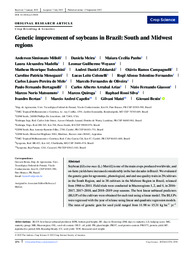Genetic improvement of soybeans in Brazil: South and Midwest regions.
Genetic improvement of soybeans in Brazil: South and Midwest regions.
Author(s): MILIOLI, A. S.; MEIRA, D.; PANHO, M. C.; MANDELLA, L. A.; WOYANN, L. G.; TODESCHINI, M. H.; ZDZIARSKI, A. D.; CAMPAGNOLLI, O. R.; MENEGAZZI, C. P.; COLONELLI, L. L.; FERNANDES, R. A. T.; MELO, C. L. P. de; OLIVEIRA, M. F. de; BERTAGNOLLI, P. F.; ARIAS, C. A. A.; GIASSON, N. F.; MATSUMOTO, M. N.; QUIROGA, M; SILVA, R. R.; BERTAN, I.; CAPELIN, M. A.; MATEI, G.; BENIN, G.
Summary: Abstract: Soybean [Glycine max (L.) Merril] is one of the main crops produced worldwide, and on-farm yields have increased considerably in the last decades in Brazil. We evaluated the genetic gain for agronomic, phenological, and end-use quality traits in 29 cultivars in the South Region, and in 38 cultivars in the Midwest Region in Brazil, released from 1966 to 2011. Field trials were conducted in Macroregions 1, 2, and 4, in 2016?2017, 2017?2018, and 2018?2019 crop seasons. The best linear unbiased predictors (BLUP) of the cultivars were obtained for each trait using a linear model. The BLUPs were regressed with the year of release using linear and quadratic regression models. The rates of genetic gain for seed yield ranged from 11.98 to 15.31 kg ha?1 yr?1 (0.33 to 0.42% yr?1) in the South Region, and from 13.58 to 21.84 kg ha?1 yr?1 (0.47 to 0.77% yr?1) in the Midwest Region. New cultivars presented taller plants and more seed oil content, oil and protein yield, and lower seed weight, days to flowering, days to maturity, and seed protein content than old cultivars in the South Region, although with differences between the Macroregions. In the Midwest Region, new cultivars showed higher seed oil content, oil and protein yield, and lower bottom pod height and seed protein content than old cultivars. Our results showed that breeding programs have been efficient to improve soybean yield and other traits across the years, without yield plateaus in sight.
Publication year: 2022
Types of publication: Journal article
Unit: Embrapa Wheat
Keywords: Melhoramento Genético Vegetal, Produtividade, Soja
Observation
Some of Embrapa's publications are published as ePub files. To read them, use or download one of the following free software options to your computer or mobile device. Android: Google Play Books; IOS: iBooks; Windows and Linux: Calibre.
Access other publications
Access the Agricultural Research Database (BDPA) to consult Embrapa's full library collection and records.
Visit Embrapa Bookstore to purchase books and other publications sold by Embrapa.

